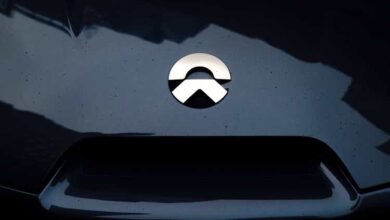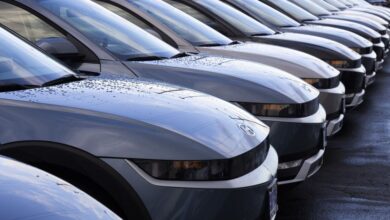Local dealership manager shares insights into electric vehicles

Local residents recently had a chance to check out a variety of electric vehicles from several manufacturers at Friendship Hyundai and Volvo on West State Street in Bristol, Tennessee.
“It was great!” said Merrie Thomsen, the dealership’s general manager. “We had different manufacturers represented.”
Thomsen partnered with Drive Electric Tennessee — Appalachian Mountains, an initiative administered by the East Tennessee Clean Fuels Coalition, for the Earth Day event. The group’s members brought “their beloved EV,” she said.
It gave locals, including potential buyers, to check out the different available electric vehicles on the market.
People are also reading…
“This was a great event to have the community learn about and test drive vehicles that they may be interested in,” Thomsen said. “It was such a success that we will try and do this annually.”
Although the event featured several brands, the Friendship lot on West State Street typically sells electric Hyundais and Volvos.
Thomsen said Hyundai features the Ioniq lineup, which includes the Ioniq 5 and the Ioniq 6. The two vehicles come in different trim levels, each with different features.
The Ioniq 5 has the SE, SEL, Limited and soon-to-be-available N, which will be the performance trim, Thomsen said. The Ioniq 5 comes in rear-wheel drive and all-wheel drive as well.
The Ioniq 6 comes in the SE, SEL and Limited.
Volvo manufactures primarily hybrid, plug-in and electric vehicles. Thomsen said the brand does not have a standard gas vehicle. The company’s goal is to be all electric by 2027, she added.
Friendship also sells hybrids and plug-in hybrids that will “provide the peace of mind to clients that want to experience the hybrid craze,” Thomsen said.
Customers often have many questions when first considering a new hybrid or electric vehicle.
“The most asked question regarding electric vehicles is ‘what is the range?’” Thomsen said.
The dealership’s salespersons are prepared and versed for those type of questions, she said. Salespersons can also help customers download applications on their cell phones to learn how to map out long-distance trips and locate chargers along the route.
The vehicles at Friendship Hyundai and Volvo have a range of about 300 miles.
“It has improved a bit from previous model years,” Thomsen said.
While Thomsen’s dealership does sell hybrid and electric vehicles, she said they are not as popular in the region as they are in many urban areas.
“I feel that people are hesitant to switch over to electric because they have not received enough information about the benefits,” Thomsen said. “Electric vehicles have been around since 1890. Most people do not realize that.”
Thomsen referred to William Morrison’s electric vehicle that was introduced in 1890 in the United States.
“I think electric vehicles will eventually grow on people,” she said. “The more they know, the more they will see the savings and benefits. I think that once the infrastructure is set up, we will see more on the road, but that will come with time.”
Hyundai and Volvo aren’t the only available hybrids or all-electric vehicles in the region. Consumers now have more choices than ever.
The Department of Energy says there are 23 plug-in electric and 36 hybrid models available in a variety of sizes, including the two-passenger Smart ED, the midsized Ford C-Max Energy, and the BMW i3 luxury SUV.
Rebates and fees
Thomsen and her staff often also answer questions about the various financial benefits and costs associated with hybrid and electric vehicles.
Buyers in both Tennessee and Virginia are eligible to obtain rebates for electric and hybrid vehicles. Tennessee customers can participate on the federal level with a $7,500 rebate.
In Virginia, the state has the Electric Vehicle Rebate Program through the Virginia Department of Energy. Residents who purchase a new or used electric vehicle are eligible for a rebate of $2,500. Used vehicles cannot cost more than $25,000. Qualified Virginia residents may also be eligible for an additional $2,000 enhanced rebate.
Both Tennessee and Virginia also charge additional registration fees for electric vehicles. The fees are in addition to standard registration and renewal fees.
The Transportation Modernization Act of 2023 increased the registration renewal fee for electric vehicles in Tennessee. For all-electric vehicles, the fee is $200, but will increase to $274 after Jan. 1, 2027, in Tennessee. For hybrid vehicles, the fee is $100 in Tennessee.
The current Tennessee fees changed back on Jan. 1, and caused some frustration among electric vehicle owners.
“Initially, some of our customers expressed their concerns about the increase in renewal fees when the legislation was first implemented, but this has mostly subsided by now,” said Sullivan County Clerk Teresa Jacobs.
Jacob’s office collects registration and renewal fees for vehicle owners in Sullivan County, including offices in Bristol, Blountville and Kingsport.
Virginia electric vehicle owners pay an annual highway fee or a per-mile road use fee. The fees are in addition to standard registration fees.
In both states, the additional fees help make up for loss fuel taxes that drivers with hybrid and electric vehicles do not pay. The fees go toward road, transit and airport maintenance.



